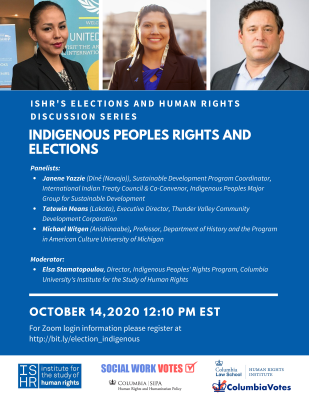A number of complex questions arise when it comes to elections and Indigenous Peoples. Disenfranchisement has taken different forms for different groups in this country. It has also had different historical roots, settler-colonial, social, political roots and legal/constitutional roots. Keeping in mind historical, socio-political and legal factors, what are the most critical contextual problems for each of these sectors for participation of Native Americans in elections? How is the fundamental right of equality and non-discrimination challenged in elections in this country? We often say that the quality of a democracy depends on how it treats minorities and Indigenous Peoples: what types of reforms would it take for a climate of confidence to be fostered in America that would encourage electoral participation? What can we learn from the struggles of movements and campaigns that got Native Americans elected, including in recent times? How are the individual and collective rights of Indigenous Peoples linked to participation in elections? How have the mobilizations around Standing Rock and Black Lives Matter affected the electorate in terms of meaningful participation in the elections? In a world of the expanding force of social media, fake news and hate speech, even in pandemic times, what is the role of media in the upcoming elections?
Panelists:
-Tatewin Means (Lakota), Executive Director, Thunder Valley Community Development Corporation
-Michael Witgen (Anishinaabe), Professor, Department of History and the Program in American Culture University of Michigan
-Janene Yazzie (Diné (Navajo)), Sustainable Development Program Coordinator, International Indian Treaty Council & Co-Convenor, Indigenous Peoples Major Group for Sustainable Development
Moderator:
Elsa Stamatopoulou, Director, Indigenous Peoples' Rights Program, Columbia University's Institute for the Study of Human Rights
For Zoom login information, please register here: http://bit.ly/election_indigenous
Bios:
-Tatewin Means: Tatewin Means is from the Sisseton Wahpeton Dakota, Oglala Lakota and Inhanktonwan nations in South Dakota. Tatewin has two children, Mankato and Persayah, and currently lives in Rapid City, SD. She has her BS in Environmental Engineering from Stanford University with a minor in Comparative Studies in Race and Ethnicity; JD with a concentration in Human Rights Law from the University of Minnesota Law School; and MA in Lakota Leadership and Management from Oglala Lakota College.
A longtime advocate for human rights, survivors, children, and families, Tatewin Means served as the Attorney General for the Oglala Sioux Tribe on the Pine Ridge Indian Reservation in South Dakota from 2012-2017. She has also served as a German Marshall Fund Marshall Memorial Fellow in 2015. From 2017-2018, Tatewin was the Graduate Studies Department Chair at Oglala Lakota College. Currently, Tatewin is the Executive Director of Thunder Valley Community Development Corporation, an Indigenous non-profit organization on the Pine Ridge Reservation, seeking to lead systemic change through the development of a regenerative community with the ultimate vision of a liberated Lakota nation through language, culture and spirituality.
-Michael Witgen: Michael Witgen is a member of the Red Cliff Band of Lake Superior Ojibwe, a past Director (twice) of the program in Native American Studies, and a professor in the Departments of American Culure and History at the University of Michigan. His publications include An Infinity of Nations: How the Native New World Shaped Early North America, (Philedelphia: University of Pennsylvania Press, 2012), and “American Indians in World History,” in the Oxford Handbook of American Indian History, ed., Fred Hoxie, (Cambridge: Oxford University Press, April 2016). Witgen’s work explores the juxtaposition of Native and European experiences and responses to the process of mutual discovery that created the New World in North America, with a particular focus on the Great Lakes and Great Plains. His current research examines the intersection of race, national identity, and state making in the Old Northwest of the early republic, and includes the essay “Seeing Red: Race, Citizenship, and Indigeneity in the Old Northwest,” published in Journal of the Early Republic in 2018, and awarded the Ralph D. Gray prize for best original article by the Society for Historians of the Early American Republic. He is also the author of Seeing Red: Indigenous Land, Black Lives, and the Political Economy of Plunder in North America forthcoming with the press of the Omohundro Institute for the Study of Early American History and Culture.
-Janene Yazzie: Janene Yazzie is an entrepreneur, community organizer and Indigenous rights and human rights advocate. She has worked on climate change, water security, food security, broadband development, energy development, and nation building with Indigenous communities for the past eleven years. She served as a research associate on several studies looking at the impacts of environmental contamination on Indigenous communities in New Mexico and Arizona. She co-founded the first community-led watershed planning program on the Navajo Nation known as the Little Colorado River Watershed Planning Project. Currently she is program manager of Sustainable Community Development with the International Indian Treaty Council (IITC). She also represents IITC as the co-convener of the Indigenous Peoples Major Group (IPMG) to the United Nations High Level Political Forum on the SDGs. The IPMG has championed rights-based approaches to landscape development including the Right Energy Partnership and the development of an international Gold Standard for landscape scale development to be launched November 2020. She ran for New Mexico Public Regulations Commission in 2018.
-Elsa Stamatopoulou: Elsa Stamatopoulou is the Director of the Indigenous Peoples' Rights Program at the Institute for the Study of Human Rights at Columbia University. Born in Athens, Greece, Stamatopoulou has devoted 21 years of her UN work to human rights, in addition to several years exclusively focusing on Indigenous Peoples rights. Most recently, she directed the work program of the Secretariat of the UN Permanent Forum on Indigenous Issues (UNPFII) as its first Chief from its inception in 2003 to 2010. She also promoted the integration, at international and national levels, of UN policies on indigenous peoples’ issues in the areas of economic and social development, environment, health, human rights, education and culture. She supervised the production of the first ever State of the World’s Indigenous Peoples publication of the United Nations (2010).






